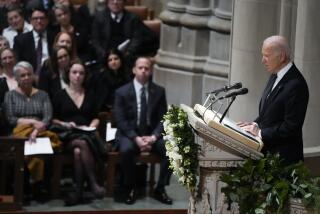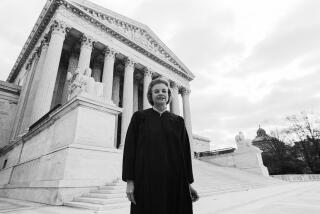The Pioneering Career of ‘Prohibition Portia’
- Share via
Before Janet Reno, there was Mabel Walker Willebrandt, the highest-ranking woman in federal government in her day and indisputably the most controversial. As assistant attorney general for seven demanding years, she enforced one of America’s most despised laws--the 18th Amendment, Prohibition--which tried to render the country “dry” and earned this woman enforcer the stinging nickname “Prohibition Portia.”
Although her vision of justice began in a dingy, overcrowded Los Angeles courtroom swarming with female junkies and prostitutes, it would take her all the way to the U.S. Supreme Court’s marble palace, where she compiled a winning record seldom equaled.
Even before 1902, when she started school at age 13 on the Missouri prairie, she had become engrossed in debate and language as she helped her German-born printer father, David Walker, set type for a newspaper.
Five years later, enrolled at a Presbyterian college, she leaped into an argument over the virgin birth and won. But as a consequence of her outspokenness, she was expelled.
Even without a college degree, she passed the teachers exam after moving with her parents to the rough-and-tumble town of Buckley, Mich. There, she soon would be nearly lost in a blizzard, trapped by a raging forest fire and threatened by a student with a knife, but her biggest battles were yet to come.
Her quick mind and comely looks attracted the tubercular school principal, Arthur Willebrandt. Seeing herself as his Joan of Arc and Florence Nightingale, she married Willebrandt and they moved to Phoenix, where he set about recuperating while she finished college and supported them on a teacher’s salary.
In 1912, the couple moved to Los Angeles. For him, Southern California was “the consumptive’s Holy Grail.” For her, it was a place for new possibilities and new experiences. With her four years of teaching experience, Mabel found work as a principal and teacher at Lincoln Park Elementary School in South Pasadena. She studied at night for her law degree at USC’s law school, which was then at 1st Street and Broadway. Soon her husband began studying law as well.
It was around this time that her hearing became severely impaired; throughout her legal career, she wore a hearing aid in each ear and spent an hour each morning arranging her hair to conceal them.
Soon her mother-in-law moved in with the couple, and Mabel supported all three of them. By 1916, she had dumped both husband and mother-in-law, and took up teaching at Utah Street Elementary School in Boyle Heights. (The Willebrandts would not divorce until 1924.)
During her last semester of law school in 1916, she began doing pro bono work in the police courts while still teaching full time. Ultimately she argued 2,000 cases as the city’s first female public defender, taking only women’s cases.
Her unwavering faith in human redemption made her a folk figure. A madam she defended asked for advice on “going straight,” saying she wanted to buy a house and raise her sons in a respectable environment. Carefully checking her client’s finances, Willebrandt advised her to keep at her profession for six more months--and then dipped into her own paycheck to help the woman make a new beginning.
The lawyer’s sense of justice led her to depart from her defense role when she urged police to patrol nickelodeon houses and stop owners from preying on young patrons, seducing and sometimes impregnating them. During the “Rosebud Baby Case,” she exhorted police to “prevent owners of nickelodeons from taking little girls who came to the Saturday morning movies behind the silver screen and getting them with babies, rosebud or otherwise.”
After graduating from law school, she opened a practice on Spring Street, handling mostly civil cases. Her partners were two classmates: Fred Horowitz, who would later build the Chateau Marmont, and John Shepherd, perhaps the only man she really loved, who was killed in World War I.
Devoted to her parents and wanting their emotional and moral support, Willebrandt moved them west in 1920, to a mulberry grove she bought in Temple City. They turned it into a chicken ranch, but plucking chickens eventually took its toll, and they subdivided the ranch for homes. David Walker kept busy selling insurance, planning a waterworks company and writing and editing for the local paper.
In 1921, at age 32, Willebrandt was well-connected and highly regarded. Her law school professor and mentor, Frank Doherty, recommended that President Warren G. Harding appoint her assistant attorney general.
Excited and confident, she accepted the appointment and its salary of $110 a month, just $10 more than her salary as a school principal. She landed in the nation’s capital with just five years’ legal experience, and was assigned the task of enforcing Prohibition. So seriously did she take her work that the press christened her “Deborah of the Drys” and “Mrs. Firebrand.”
Four years later, she adopted a 2-year-old girl named Dorothy. On her frequent visits o Los Angeles, her parents took care of their grandchild.
Willebrandt’s job did not prevent her from campaigning in 1928 for Republican presidential candidate Herbert Hoover. She used Bible verse and radio to unite conservative Protestant prohibitionists and Republican women voters, and Hoover won the election. The press declared that “no other woman has ever had so much influence on a presidential campaign.” Anti-Hoover critics shot back by splashing her “quiet” 1924 divorce across the papers, reporting how she “deserted and abandoned” poor Arthur Willebrandt.
Personally devastated and disgusted with politics, she left the Justice Department in 1929 for private practice, pioneering the fields of aviation and radio law. An expert in federal regulations and taxes, she represented major industries, including Metro-Goldwyn-Mayer and the Screen Directors Guild of America. As general counsel for the cargo airline Aviation Corp. of America, she laid the groundwork for a new airmail rate scale and changed the terms of government contract bidding.
She also got her pilot’s license and promoted air travel with Amelia Earhart, a fellow member of the Aeronautical Chamber of Commerce.
When Willebrandt moved to West Hollywood in the 1940s, her most powerful Hollywood friend and client was Louis B. Mayer. When the IRS was vigorously investigating other producers, she not only enabled Mayer to avoid fines, but even got him--legally--a $48,000 refund. Her friendship with Mayer and her tax expertise brought her such star clients as Jean Harlow, Clark Gable and Jeanette MacDonald.
Willebrandt died of lung cancer in 1963. Her lifelong friend, future federal Judge John J. Sirica, who would preside over the Watergate case, said of her in 1978, “If Mabel had worn trousers, she could have been president.”
More to Read
Sign up for Essential California
The most important California stories and recommendations in your inbox every morning.
You may occasionally receive promotional content from the Los Angeles Times.













